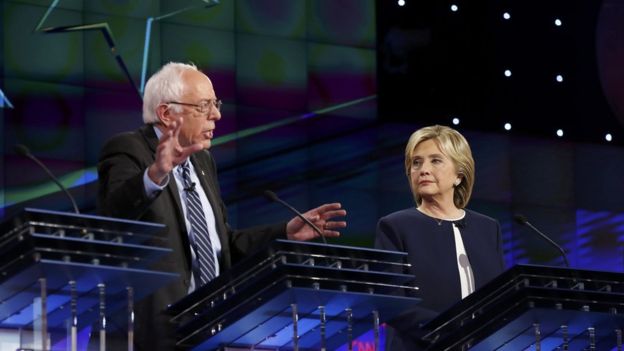[BBC] It’s been almost a month since the last Democrats headed to the polls to vote for their party’s nominee and even longer since the identity of the winner of that campaign, Hillary Clinton, was in doubt.
But at last, Bernie Sanders shared a stage with his primary opponent and acknowledged the obvious.
“Secretary Clinton has won the Democratic nominating process, and I congratulate her for that,” Mr Sanders said, as his former adversary stood just a few feet from him, head bobbing in agreement.
That little nugget prompted furious applause from a New Hampshire gymnasium packed with nearly 3,000 enthusiastic Clinton supporters and far fewer notably less enthusiastic Sanders backers, some of whom walked out when their man conceded defeat.
The line came after Mr Sanders boasted of all the votes he had received (around 13 million) and state primaries and caucuses he won (22, including – he added – New Hampshire by a large margin), of the small donations he had amassed ($2.5m) and convention delegates he had accrued (1,900).
It was followed by what was, for all intents and purposes, a recapitulation of the Sanders campaign stump speech, complete with calls for a minimum wage increase, rebuilt infrastructure, affordable college education, healthcare reform and more environmental protections, and prefaced with a few “Hillary Clinton understands” and “Hillary Clinton knows”.
It was hard to tell at times whether Mr Sanders was trying to convince his supporters to join him in backing the party’s soon-to-be-official nominee or basking in his campaign’s achievements.

He repeatedly warned of the dangers of a Donald Trump presidency and heralded how his delegates worked with Ms Clinton’s to craft “by far, the most progressive platform in the history of the Democratic Party”.
The platform achievements are notable. His forces successfully pushed the party to the left on raising the minimum wage, a government-provided health-insurance option, environmental protections and free state university education.
Platform victories are almost always ephemeral, however. While Mr Sanders pledged to ensure the platform is implemented by a Democratic-led government, the reality is that on battles where a policy is actually at play, like whether to reject the Trans-Pacific Partnership, the Sanders delegates failed to get their way.
The same goes for a measure condemning the Israeli “occupation” of Palestine – a foreign policy topic where key Democratic constituencies drew a line in the sand.
In the end the president sets the direction of the party, and platform statements are largely consigned to history’s dingy filing cabinets.
So Mrs Clinton was content to nod, smile and even throw a few bones to the remaining Sanders supporters during her speech, telling them that they will always have a seat at the table in her White House.
She got what she needed out of the Sanders endorsement event – an acknowledgment of her victory, a direct endorsement, a call for unity and a speech-ending hug between former adversaries. The Clinton campaign hopes all of that will pave the way to a smooth Democratic convention in two weeks and blunt some of the attempts Mr Trump has made to woo Sanders supporters into his camp.
And Mr Trump is certainly in full woo. While the joint event in New Hampshire was chugging along, he was busy firing tweets that alternated between slams on Mr Sanders for being hypocritical and highlights of where he agrees with the Vermont senator.
“To all the Bernie voters who want to stop bad trade deals and global special interests, we welcome you with open arms,” he wrote. “People first.”
It seems unlikely that those backing a self-professed Democratic Socialist will fall in line behind the New York billionaire, but their lack of enthusiasm for Mrs Clinton – even after the endorsement – is palpable.
“You have to be the biggest sell-out ever,” Patrick Hall wrote on the Sanders post announcing the endorsement on the former candidates Facebook page. “She is literally everything you’ve been complaining about, and you’re going to forget all of that in the name of partisan politics.”
Mr Sanders and Mrs Clinton can share kind words. They can stand together in front of a “stronger together” sign. They can raise their arms up in a show of unity. But unless people like Patrick Hall are few and far between, such gestures will bear little fruit.
They may never vote for Mr Trump, but they could turn to the Green Party’s Jill Stein. Or stay home. Either outcome puts Donald Trump a bit closer to the White House.
The Sanders supporters have no option than rally support around Hilary Clinton if at all they don’t want a Trump President..Period